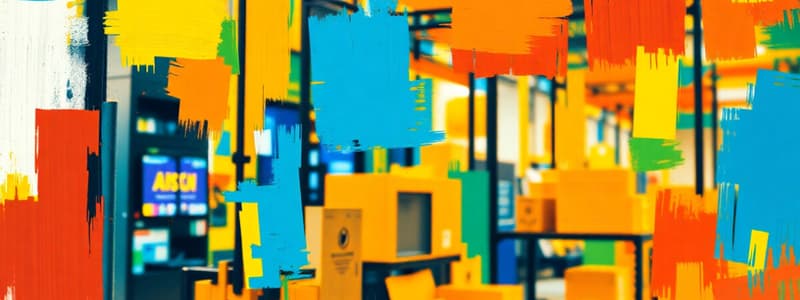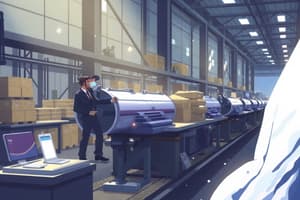Podcast
Questions and Answers
What is the primary goal of production planning in an ERP system?
What is the primary goal of production planning in an ERP system?
- To maintain high inventory levels
- To eliminate the need for scheduling
- To create a production plan that meets demand (correct)
- To acquire excess raw materials
How does Just-in-Time (JIT) production contribute to operational efficiency?
How does Just-in-Time (JIT) production contribute to operational efficiency?
- By enhancing the complexity of ordering processes
- By ensuring raw materials are delivered as needed (correct)
- By encouraging the storage of large quantities of inventory
- By creating excess inventory to prevent shortages
What role does Material Resource Planning (MRP) play in an ERP system?
What role does Material Resource Planning (MRP) play in an ERP system?
- To manage the purchasing of raw materials and scheduling of production (correct)
- To forecast sales for future production
- To determine employee scheduling needs
- To eliminate the need for inventory management
What is a common issue with traditional production systems?
What is a common issue with traditional production systems?
What does Capacity Planning evaluate within an ERP system?
What does Capacity Planning evaluate within an ERP system?
Which of the following is NOT a benefit of ERP systems in production management?
Which of the following is NOT a benefit of ERP systems in production management?
What does the acronym BOM stand for in the context of ERP systems?
What does the acronym BOM stand for in the context of ERP systems?
Which module assists with real-time factory floor information in ERP systems?
Which module assists with real-time factory floor information in ERP systems?
What is a key feature of Advanced Planning and Scheduling (APS) systems?
What is a key feature of Advanced Planning and Scheduling (APS) systems?
What is one primary objective of an effective materials management system within ERP frameworks?
What is one primary objective of an effective materials management system within ERP frameworks?
What is a primary benefit of integrating ERP systems with activity-based costing?
What is a primary benefit of integrating ERP systems with activity-based costing?
How does SAP’s R/3 system contribute to direct cost calculation?
How does SAP’s R/3 system contribute to direct cost calculation?
What is a key feature of activity-based budgeting?
What is a key feature of activity-based budgeting?
What aspect of traditional production systems is often criticized?
What aspect of traditional production systems is often criticized?
What challenge is associated with nonfinancial measures in accounting systems?
What challenge is associated with nonfinancial measures in accounting systems?
What is a key function of ERP systems in relation to supply chain management?
What is a key function of ERP systems in relation to supply chain management?
Which of the following is a disadvantage of traditional production systems?
Which of the following is a disadvantage of traditional production systems?
What is a benefit of collecting nonfinancial measures in an ERP context?
What is a benefit of collecting nonfinancial measures in an ERP context?
Which of the following accurately describes 'activity cost driver' in the context of materials handling?
Which of the following accurately describes 'activity cost driver' in the context of materials handling?
What role does the process of materials handling play within ERP systems?
What role does the process of materials handling play within ERP systems?
Just-in-Time systems aim to maintain excess inventory levels at all times.
Just-in-Time systems aim to maintain excess inventory levels at all times.
Capacity planning involves evaluating production capacity against production goals.
Capacity planning involves evaluating production capacity against production goals.
Material Resource Planning (MRP) does not use sales forecasts to identify products needed.
Material Resource Planning (MRP) does not use sales forecasts to identify products needed.
Inadequate information from other divisions can lead to excessive inventories.
Inadequate information from other divisions can lead to excessive inventories.
In operational-level processes, receiving refers only to the inspection of quality control.
In operational-level processes, receiving refers only to the inspection of quality control.
ERP systems provide total integration including supply chain processes.
ERP systems provide total integration including supply chain processes.
The primary goal of production systems is to create marketing strategies.
The primary goal of production systems is to create marketing strategies.
Advanced Planning and Scheduling (APS) systems support business analysis but not data collection.
Advanced Planning and Scheduling (APS) systems support business analysis but not data collection.
Excessive lead times in sequential design can slow down production processes.
Excessive lead times in sequential design can slow down production processes.
Production must be connected to sales to maintain inappropriate inventory levels.
Production must be connected to sales to maintain inappropriate inventory levels.
Activity-based costing systems require an accurate activity cost driver to function effectively.
Activity-based costing systems require an accurate activity cost driver to function effectively.
ERP systems do not integrate nonfinancial measures for decision-making processes.
ERP systems do not integrate nonfinancial measures for decision-making processes.
SAP's R/3 system provides a link between production planning and financial management.
SAP's R/3 system provides a link between production planning and financial management.
Traditional production systems are often criticized for having no integration within the organization.
Traditional production systems are often criticized for having no integration within the organization.
Activity-based budgeting can anticipate demand on a process and estimate practical capacity.
Activity-based budgeting can anticipate demand on a process and estimate practical capacity.
Materials handling processes attributed to specific products do not consider direct costs.
Materials handling processes attributed to specific products do not consider direct costs.
The inclusion of built-in controls in ERP systems enhances the reliability of data.
The inclusion of built-in controls in ERP systems enhances the reliability of data.
Activity-based costing systems often derive information from highly structured accounting systems.
Activity-based costing systems often derive information from highly structured accounting systems.
The number of pallet moves is considered an activity cost driver in materials handling.
The number of pallet moves is considered an activity cost driver in materials handling.
ERP systems have no impact on improving e-business opportunities.
ERP systems have no impact on improving e-business opportunities.
Flashcards
ERP Production Management
ERP Production Management
An ERP system's component that manages the entire production process, from planning to execution.
Materials Management
Materials Management
An ERP system's component that manages the flow of materials from sourcing to inventory to production.
Traditional Production Systems
Traditional Production Systems
Older production models that lack integration between different departments, leading to issues with inventory, planning and forecasting errors.
Production Planning
Production Planning
Signup and view all the flashcards
Materials Requirements Planning (MRP)
Materials Requirements Planning (MRP)
Signup and view all the flashcards
Just-in-Time (JIT) Systems
Just-in-Time (JIT) Systems
Signup and view all the flashcards
Capacity Planning
Capacity Planning
Signup and view all the flashcards
Manufacturing Execution Systems (MES)
Manufacturing Execution Systems (MES)
Signup and view all the flashcards
eBusiness Strategies
eBusiness Strategies
Signup and view all the flashcards
ERP Systems and Activity-Based Costing
ERP Systems and Activity-Based Costing
Signup and view all the flashcards
Activity Cost Driver
Activity Cost Driver
Signup and view all the flashcards
Activity-Based Budgeting
Activity-Based Budgeting
Signup and view all the flashcards
SAP's R/3 System
SAP's R/3 System
Signup and view all the flashcards
Traditional Production Systems
Traditional Production Systems
Signup and view all the flashcards
ERP Integration and Supply Chain
ERP Integration and Supply Chain
Signup and view all the flashcards
Material Resource Planning
Material Resource Planning
Signup and view all the flashcards
Capacity Planning
Capacity Planning
Signup and view all the flashcards
ERP Production Management
ERP Production Management
Signup and view all the flashcards
Materials Management
Materials Management
Signup and view all the flashcards
Traditional Production Systems
Traditional Production Systems
Signup and view all the flashcards
Production Planning
Production Planning
Signup and view all the flashcards
Materials Requirements Planning (MRP)
Materials Requirements Planning (MRP)
Signup and view all the flashcards
Just-in-Time (JIT) Systems
Just-in-Time (JIT) Systems
Signup and view all the flashcards
Capacity Planning
Capacity Planning
Signup and view all the flashcards
Manufacturing Execution Systems (MES)
Manufacturing Execution Systems (MES)
Signup and view all the flashcards
eBusiness Strategies
eBusiness Strategies
Signup and view all the flashcards
ERP and Activity-Based Costing
ERP and Activity-Based Costing
Signup and view all the flashcards
Activity Cost Driver
Activity Cost Driver
Signup and view all the flashcards
Activity-Based Budgeting
Activity-Based Budgeting
Signup and view all the flashcards
SAP's R/3 System
SAP's R/3 System
Signup and view all the flashcards
Traditional Production Systems
Traditional Production Systems
Signup and view all the flashcards
ERP Integration & Supply Chain
ERP Integration & Supply Chain
Signup and view all the flashcards
Cost Control via ERP
Cost Control via ERP
Signup and view all the flashcards
Productivity via ERP
Productivity via ERP
Signup and view all the flashcards
Streamlined Operations via ERP
Streamlined Operations via ERP
Signup and view all the flashcards
Managerial Decision Making via ERP
Managerial Decision Making via ERP
Signup and view all the flashcards
Study Notes
ERP Systems: Production and Materials Management
- ERP systems integrate production management and materials management systems
- Objectives include understanding the production and materials management systems, and recognizing the interrelationships between supporting business processes
- Case study of Atlantic Manufacturing highlights issues with inconsistent raw materials, finished goods, untimely change specifications, long lead times and inadequate information, and lost purchasing requisitions.
- Manufacturing systems background shows evolution of re-order point systems evolving to high-volume production of few products; later to mainframe based databases for new product demand and flexible manufacturing systems with feedback and control, eventually culminating in 90s integration of processes and data for efficient operation via ERP total integration including the supply chain
- Traditional production systems were not integrated across divisions, resulting in problems such as improper inventory levels, incorrect purchasing decisions, excess or shortage of raw materials and finished products, and excessive inventories. This impacts cash flow and profitability
- Production system objectives include creating a production plan, acquiring raw materials, scheduling equipment, facilities, and human resources, and designing and producing goods with appropriate quantities and quality level
- Operational-level processes include daily activities, purchasing, receiving, inspection of deliveries, quality control, monitoring of receivables for acceptability, inventory management, and inventory level maintenance
- Information systems support production planning and manufacturing processes, including data collection systems, material management systems, BOM systems, inventory management systems and cost accounting systems
- Material Resource Planning (MRP) processes include identifying stock needs, calculating lead times, determining safety stock levels, assigning order quantities, and producing accurate purchase orders. MRP takes inputs from the Master Production Schedule (MPS) which employs sales forecasts to identify products needed. Key MRP vocabulary includes MRP, BOM, Lead times, Lot sizing, MPS, Gross requirements and planned orders.
- Just-in-Time (JIT) systems maintain only necessary inventory levels, requiring deliveries only as needed to meet production schedules, using EDI or Internet for orders, and reducing pre and post-production storage cost and space with improved supply chain and value chain management
- Capacity planning evaluates production capacity against production goals, requiring specific information to create time-phased plans for production areas, allocating specific facilities, and estimating human resources. Product design and development is integrated with cost information, allowing comparison of alternatives to decrease expenses.
- ERP extends information distribution, supporting materials requirements planning, inventory management and capacity planning by merging multiple databases, eliminating paperwork and bottlenecks to decrease design costs, lead time and personnel costs, increasing productivity, providing sales forecasts for production plans, managing quantities and dates for finished products. It creates efficient detailed material plans, determining what needs to be ordered and when, and creating work orders that send production information to manufacturing, providing integration across the entire system
- Materials Management Modules include Factory floor information and communication systems (MES) for real-time feedback; Business analysis and support systems (APS) using data for decision support using real-time data collected and leveraged through mobile phones and Internet enabled devices, leading to automated data collection.
- eBusiness Strategies facilitate communication along the supply chain, utilize B2B utilizing many suppliers and Internet enabled quick and ease of information exchange, utilizing marketplaces for aggregation of buyers to improve purchasing power and reduce costs, for more efficient supply chains and to handle RFPs more quickly
- Featured Article focuses on ABC (Activity-Based Costing), questioning what manufacturing data is used for managerial accounting in ERP, how is this information used for controlling costs, maximizing productivity, streamlining operations and supporting managerial decision making.
- Activity-based costing systems need the right activity cost driver and nonfinancial measures are often difficult to find. ERP systems increase availability, reliability, and allow for integration of multiple systems
- SAP's R/3 system links production planning to materials management, allows establishment of standards, utilizing Activity cost drivers such as "number of pallet moves", attributed to materials handling for specific products, allowing direct cost calculations instead of being considered overhead.
- Activity-based budgeting anticipates demand on process, estimates practical capacity, quantity of direct materials and direct costs, to be used for improving processes and determining adjustments. ERP systems collect nonfinancial measures and have formal processes, including built in controls and high degree of integrity
- Summary describes how traditional production systems lacked integration, and most production planning lacks coordination with the organization's manufacturing, particularly at the operational level. Organization's are seeking material resource planning, JIT systems, and capacity planning, and ERP systems offer both production planning and materials management, facilitating communication to improve e-Business opportunities
Studying That Suits You
Use AI to generate personalized quizzes and flashcards to suit your learning preferences.
Related Documents
Description
This quiz delves into ERP systems, focusing on production and materials management. It explores integration issues and the progression from traditional systems to modern ERP solutions, using Atlantic Manufacturing as a case study to illustrate challenges. Test your knowledge on the key concepts and interrelationships in these essential business processes.




